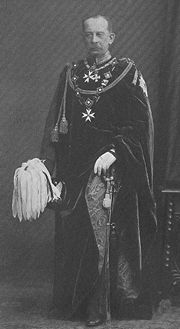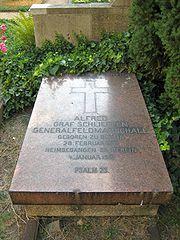
Alfred Graf von Schlieffen
Encyclopedia

Germany
Germany , officially the Federal Republic of Germany , is a federal parliamentary republic in Europe. The country consists of 16 states while the capital and largest city is Berlin. Germany covers an area of 357,021 km2 and has a largely temperate seasonal climate...
field marshal
Field Marshal
Field Marshal is a military rank. Traditionally, it is the highest military rank in an army.-Etymology:The origin of the rank of field marshal dates to the early Middle Ages, originally meaning the keeper of the king's horses , from the time of the early Frankish kings.-Usage and hierarchical...
and strategist
Strategist
A design strategist has the ability to combine the innovative, perceptive and holistic insights of a designer with the pragmatic and systemic skills of a planner to guide strategic direction in context of business needs, brand intent, design quality and customer values...
who served as Chief of the Imperial
German Empire
The German Empire refers to Germany during the "Second Reich" period from the unification of Germany and proclamation of Wilhelm I as German Emperor on 18 January 1871, to 1918, when it became a federal republic after defeat in World War I and the abdication of the Emperor, Wilhelm II.The German...
German General Staff
German General Staff
The German General Staff was an institution whose rise and development gave the German armed forces a decided advantage over its adversaries. The Staff amounted to its best "weapon" for nearly a century and a half....
from 1891 to 1906. His name lived on in the 1905 Schlieffen Plan
Schlieffen Plan
The Schlieffen Plan was the German General Staff's early 20th century overall strategic plan for victory in a possible future war in which the German Empire might find itself fighting on two fronts: France to the west and Russia to the east...
for the defeat of the French Third Republic
French Third Republic
The French Third Republic was the republican government of France from 1870, when the Second French Empire collapsed due to the French defeat in the Franco-Prussian War, to 1940, when France was overrun by Nazi Germany during World War II, resulting in the German and Italian occupations of France...
and the Russian Empire
Russian Empire
The Russian Empire was a state that existed from 1721 until the Russian Revolution of 1917. It was the successor to the Tsardom of Russia and the predecessor of the Soviet Union...
.
Biography
Schlieffen was born in BerlinBerlin
Berlin is the capital city of Germany and is one of the 16 states of Germany. With a population of 3.45 million people, Berlin is Germany's largest city. It is the second most populous city proper and the seventh most populous urban area in the European Union...
on 28 February 1833 as the son of a Prussian army
Prussian Army
The Royal Prussian Army was the army of the Kingdom of Prussia. It was vital to the development of Brandenburg-Prussia as a European power.The Prussian Army had its roots in the meager mercenary forces of Brandenburg during the Thirty Years' War...
officer. He entered the army in 1854 at the age of 20. Quickly moving to the general staff
German General Staff
The German General Staff was an institution whose rise and development gave the German armed forces a decided advantage over its adversaries. The Staff amounted to its best "weapon" for nearly a century and a half....
, he participated in the Austro-Prussian War
Austro-Prussian War
The Austro-Prussian War was a war fought in 1866 between the German Confederation under the leadership of the Austrian Empire and its German allies on one side and the Kingdom of Prussia with its German allies and Italy on the...
in 1866, and in the Franco-Prussian War
Franco-Prussian War
The Franco-Prussian War or Franco-German War, often referred to in France as the 1870 War was a conflict between the Second French Empire and the Kingdom of Prussia. Prussia was aided by the North German Confederation, of which it was a member, and the South German states of Baden, Württemberg and...
of 1870–71. In 1884, Schlieffen became head of the military history section of the general staff, replacing Count von Waldersee
Alfred Graf von Waldersee
Alfred Ludwig Heinrich Karl Graf von Waldersee was a German Generalfeldmarschall who served as Chief of the Imperial German General Staff from 1888 to 1891 and as Allied Supreme Commander in China in 1900-1901.-Family:Alfred von Waldersee was the fifth of six children of the Prussian cavalry...
as chief of the Prussian General Staff in 1891, after thirty-eight years of military service.
In 1905 Schlieffen presented the Schlieffen Plan
Schlieffen Plan
The Schlieffen Plan was the German General Staff's early 20th century overall strategic plan for victory in a possible future war in which the German Empire might find itself fighting on two fronts: France to the west and Russia to the east...
a scheme to prevent Germany
Germany
Germany , officially the Federal Republic of Germany , is a federal parliamentary republic in Europe. The country consists of 16 states while the capital and largest city is Berlin. Germany covers an area of 357,021 km2 and has a largely temperate seasonal climate...
from having to fight a two-front war
Two-front war
In military terminology, a two-front war is one in which fighting takes place on two geographically separate fronts. It is usually executed by two or more separate forces simultaneously or nearly simultaneously, in the hope that their opponent will be forced to split their fighting force to deal...
by first defeating France quickly, then throwing its full weight against Russia.
The rest of Schlieffen’s career was spent inculcating the operational ideas required to make this strategy work. He retired on 1 January 1906 after nearly 53 years of service and died in Berlin on January 4, 1913, just nineteen months before the outbreak of the First World War. In reference to his Schlieffen Plan
Schlieffen Plan
The Schlieffen Plan was the German General Staff's early 20th century overall strategic plan for victory in a possible future war in which the German Empire might find itself fighting on two fronts: France to the west and Russia to the east...
, Schlieffen's last words were said to have been, "Remember: keep the right wing strong."
Influence

although criticized for his "narrow-minded military scholasticism."
Schlieffen's operational theories were to have a profound impact on the development of maneuver warfare
Maneuver warfare
Maneuver warfare, or manoeuvre warfare , is the term used by military theorists for a concept of warfare that advocates attempting to defeat an adversary by incapacitating their decision-making through shock and disruption brought about by movement...
in the twentieth century, largely through his seminal treatise, Cannae, which concerned the decidedly un-modern battle of 216 BC in which Hannibal defeated the Romans.
His theories were studied exhaustively, especially in the higher army academies of the United States and Europe after World War I. American military thinkers thought so highly of him that his principal literary legacy, Cannae, was translated at Fort Leavenworth
Fort Leavenworth
Fort Leavenworth is a United States Army facility located in Leavenworth County, Kansas, immediately north of the city of Leavenworth in the upper northeast portion of the state. It is the oldest active United States Army post west of Washington, D.C. and has been in operation for over 180 years...
and distributed within the U.S. Army and to the academic community.
As General Walter Bedell Smith
Walter Bedell Smith
Walter Bedell "Beetle" Smith was a senior United States Army general who served as General Dwight D. Eisenhower's chief of staff at Allied Forces Headquarters during the Tunisia Campaign and the Allied invasion of Italy...
, chief of staff to General Dwight D. Eisenhower
Dwight D. Eisenhower
Dwight David "Ike" Eisenhower was the 34th President of the United States, from 1953 until 1961. He was a five-star general in the United States Army...
, supreme commander of the Allied Expeditionary Force in World War II
World War II
World War II, or the Second World War , was a global conflict lasting from 1939 to 1945, involving most of the world's nations—including all of the great powers—eventually forming two opposing military alliances: the Allies and the Axis...
, pointed out, General Eisenhower and many of his staff officers, products of these academies, "were imbued with the idea of this type of wide, bold maneuver for decisive results."
General Erich Ludendorff
Erich Ludendorff
Erich Friedrich Wilhelm Ludendorff was a German general, victor of Liège and of the Battle of Tannenberg...
, a disciple of Schlieffen who applied his teachings of encirclement
Encirclement
Encirclement is a military term for the situation when a force or target is isolated and surrounded by enemy forces. The German term for this is Kesselschlacht ; a comparable English term might be "in the bag"....
in the Battle of Tannenberg
Battle of Tannenberg (1914)
The Battle of Tannenberg was an engagement between the Russian Empire and the German Empire in the first days of World War I. It was fought by the Russian First and Second Armies against the German Eighth Army between 23 August and 30 August 1914. The battle resulted in the almost complete...
, once famously christened Schlieffen as "one of the greatest soldiers ever."
Long after his death, the German General Staff
German General Staff
The German General Staff was an institution whose rise and development gave the German armed forces a decided advantage over its adversaries. The Staff amounted to its best "weapon" for nearly a century and a half....
officers of the Interwar
Interwar period
Interwar period can refer to any period between two wars. The Interbellum is understood to be the period between the end of the Great War or First World War and the beginning of the Second World War in Europe....
and World War II
World War II
World War II, or the Second World War , was a global conflict lasting from 1939 to 1945, involving most of the world's nations—including all of the great powers—eventually forming two opposing military alliances: the Allies and the Axis...
period, particularly General Hans von Seeckt
Hans von Seeckt
Johannes Friedrich "Hans" von Seeckt was a German military officer noted for his organization of the German Army during the Weimar Republic.-Early life:...
, recognized an intellectual debt to Schlieffen theories during the development of the Blitzkrieg
Blitzkrieg
For other uses of the word, see: Blitzkrieg Blitzkrieg is an anglicized word describing all-motorised force concentration of tanks, infantry, artillery, combat engineers and air power, concentrating overwhelming force at high speed to break through enemy lines, and, once the lines are broken,...
doctrine.
Quotations
- "A man is born, and not made, a strategist."—Schlieffen
- "To win, we must endeavour to be the stronger of the two at the point of impact. Our only hope of this lies in making our own choice of operations, not in waiting passively for whatever the enemy chooses for us."—Schlieffen

